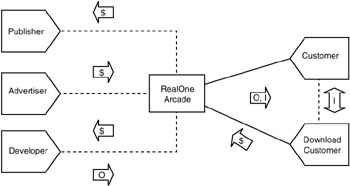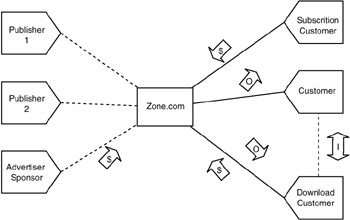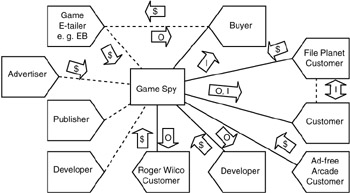Intermediaries and Combined Models
While the direct-to-customer model trumpets disintermediation, other companies have found success as intermediaries. Sites like Real's RealOne Arcade, MSN's Zone.com, and GameSpy attract a large audience of gamers by offering content, matchmaking services, and a large number of free casual games. At first glance, these sites might appear to be direct competitors, but in some instances, they are also partners. These larger sites employ a combination of online models and can provide valuable insights to independent developers.
Combined models can cause potential conflicts or synergies. Almost all gaming sites have forums or chatrooms because a loyal virtual community generally leads to repeat business and a good direct-to-customer relationship. On the other hand, a game reviewer site that also sells games has a clear conflict of interest: it might be tempted to give glowing reviews to its own products.
RealOne Arcade
In 2001, Real launched its games division called RealOne Arcade. As shown in Figure 2.7.5, RealOne Arcade is essentially an aggregator that collects comparable products for display in one site. For customers, it concentrates information about offered products, which lowers search and decision costs. For developers and publishers, it profiles their products with editorial content and user reviews. Registered users have access to forums and lobbies for multiplayer matchmaking. Thus, RealOne Arcade serves as a content provider, a virtual community, a direct-to-customer business, and an intermediary.

Figure 2.7.5: RealOne Arcade aggregates games from publishers and independent developers. Advertisers are eager to reach consumers of the high profile site.
For the independent developer, Real offers the RealOne Arcade Developer Service. An independent developer can submit a game in any format and Real performs many of the duties of a publisher, such as quality assurance, marketing, distribution, and transaction processing. Developers have a choice of exclusive or non-exclusive agreements. If the developer has an exclusive agreement with Real, then the game stays on the site for a window of time in exchange for better promotion and a better royalty rate. If non-exclusive, such as with CogniToy's 5 Card Dash, then the developer is free to sell the game elsewhere.
Real also works with established publishers to sell known games like Centipede. Both publishers and developers use Real as a value-added distribution channel. All the parties benefit from these arrangements. For RealOne Arcade, the presence of diverse games helps to spur its virtual community, which in turn justifies its advertising rates.
Of the games on RealOne Arcade, many are free Web-based games supported by advertising. The higher-quality, downloadable games are available at different price levels. Consumers can buy games on transaction or through a subscription service called GamePass. Real's proprietary anti-piracy software ensures that the distribution is secure.
Unlike Digital Tome's offering, all of RealOne Arcade's games are small "coffee break" games intended for casual gamers. Most are single-player and can even be downloaded to PDAs. According to Andrew Wright, general manager of the company's game division, traditional retail distribution remains the best channel to reach hardcore gamers but the situation is completely different for casual gamers. He says, "For the casual audience, they can't walk into retail to find games that are relevant. They need ease of use. Digital delivery provides a level of convenience that the retail brick-and-mortar crew can't compete with."
Zone.com
MSN's gaming channel Zone.com, as depicted in Figure 2.7.6, also uses a combination of the content provider, virtual community, direct-to-customer, and intermediary models. However, unlike RealOne Arcade, its goal as an aggregator is not to sell games but to provide multiplayer support for a variety of games. Zone.com has over 100 games available for retail matchmaking, while RealOne Arcade offers only a handful of games with multiplayer play. From its onset, Zone.com has focused on both hardcore and casual players.

Figure 2.7.6: Zone.com aggregates games from different publishers for retail matchmaking. Advertisers promote products to consumers through sponsored games.
Hardcore gamers rely on matchmaking services to find teammates and challengers. Microsoft does have its own games up on Zone.com, but other game publishers are represented as well. This would appear to be a direct conflict, but Zone.com has no incentive to drive players toward one game or the other. The retail games supported on the Zone have been sold already, and publishers tend to view multiplayer play as a value-added service. Zone.com's group product manager Chris Di Cesare says, "We benefit from the advantage of the increased traffic that we get through the players on the Zone and [the other publishers] get the advantage of the service and support that we provide through having the site." The other publishers do not pay Zone.com to host their games.
Zone.com is also the exclusive gateway to Microsoft's MMORPG Asheron's Call, which is subscription-based. The virtual community from Asheron's Call does not tend to spill over to other parts of Zone.com. Instead, Zone.com provides its own chatrooms and a chat service called Zone Friends. To generate interest in its games, it regularly holds tournaments and allows players to organize their own tournaments.
Advertising and sponsorship constitutes about 72% of Zone.com revenues. Zone.com pioneered what it calls "adver-gaming." "Adver-gaming" would include the 3D racing game Toyota Adrenaline, which featured a Toyota Tundra truck in the game-play and coincided with a six-month long Toyota sales promotion. Other sponsorship opportunities exist with the trivia game OutSmart. Launched in 2001, OutSmart pits a celebrity against players to answer questions about the celebrity's work. Players compete for prizes donated by the sponsor. Various TV shows, music publishers, and movie studios have paid Zone.com to host a celebrity on OutSmart in order to reach MSN's large Internet audience. Episodes are archived in the OutSmart gallery. In addition, some tournaments, such as the Bourne Identity Trivia Challenge, are sponsored.
Games like OutSmart appeal to casual gamers, and Di Cesare feels that this segment of the online market is becoming more and more important. For this reason, Zone.com has begun to offer higher-quality downloadable games for casual gamers. Casual gamers can also play Zone.com's free Web-based games.
GameSpy
As indicated in Figure 2.7.7, GameSpy has a lot of revenue streams. As CEO Mark Surfas says, "In a really uncertain environment, we found it would be best to try to capture as many revenue streams as we could." This strategy has worked well for GameSpy because some revenue streams have surged while others have receded.

Figure 2.7.7: GameSpy business model.
GameSpy is a vortal, meant to be "Gaming's Homepage" and the #1 destination for people to read, try, buy, and play games. GameSpy is a content provider, the largest creator of editorial content with GameSpy Daily ("24-hour gaming news coverage from the inside") and over 55 player-run Web sites. Each hosted Web site aims to be the information source for a specific game with forums, content, chat, and an active community. In addition, GameSpy runs its own forums and aggregates all available forums on ForumPlanet. Capitalizing on its virtual community, GameSpy sells advertising.
Like RealOne Arcade, GameSpy Arcade has a large number of free and pay-to-play casual games. Like Zone.com, GameSpy Arcade supports retail matchmatching for hardcore gamers. Another application, GameSpy 3D, is for players who do not want chat, forums, Web browsing, and events. GameSpy's audience is nearly 97% male and 80% are using broadband.
Besides advertising, GameSpy has other significant revenue streams. GameSpy licenses technology for anti-piracy systems, in-game matchmaking, in-game voice chat, and other software tools. It has worked with almost every large publisher in the industry. In fact, RealOne Arcade is a customer of GameSpy in this way.
For consumers, GameSpy offers a variety of services and subscriptions. In File-Planet, gamers can pay to have high priority to GameSpy's extensive library of cheats, files, and guides. On GameSpy Arcade, players can pay a one-time fee to turn off the ads that would run on the free service. In addition, GameSpy sells its voice chat software Roger Wilco directly to consumers.
GameSpy also acts as an intelligent price-comparing agent for buyers. GameSpy receives a commission for sending leads to online retailers. According to Surfas, this way, GameSpy works with all of the retailers and can have a relationship with all of them. Surfas tends to view other gaming businesses as potential partners rather than competitors. It's a viewpoint that has helped GameSpy to grow and succeed.
While he does not believe that digital distribution will ever replace the traditional retail market, Surfas is betting that digital distribution will become more important and is devoting energy to develop technologies to download top-tier games. In the future, GameSpy On-Demand will allow players to rent or buy games.
EAN: 2147483647
Pages: 275